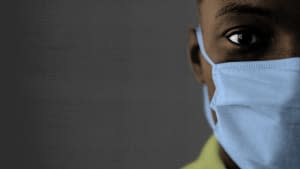In support of the CDC's new mask guidance

Actually, masking up is good.
With the Delta variant of the COVID-19 virus spreading like wildfire in much of the country, the CDC on Tuesday again revised its guidance on mask-wearing — recommending that everyone, including vaccinated persons, wear masks indoors in high-transmission communities. There was, predictably, an immediate backlash. Missouri's Republican attorney general threatened to sue the mayor of Kansas City for re-imposing an indoor mask mandate in the city. "The federal government cares more about masks than vaccines," Reason's Robby Soave wrote on Twitter.
That's silly. Federal officials have been encouraging and begging and wheedling the public to get vaccinated for months — and doing it in the face of rather vocal opposition from the Fox News crowd. But even if all the holdouts got their first shots today, putting on masks might still be the most effective short-term measure to take against Delta's spread.
Why? Because immunity takes time to develop, while putting on a mask is something you can do right this minute. We already know that a single dose of the Pfizer and AstraZeneca vaccines is less effective against Delta than it has been against the original virus; people aren't considered fully vaccinated until roughly two weeks after they've received their second dose. So even if everything went perfectly with the vaccine campaign from this moment going forward, it would still be more than a month before the newly inoculated would be comfortably protected against the virus.
Meanwhile, we know mask mandates can be effective. The CDC found last year that in my own state of Kansas, COVID cases dropped in the 24 counties that required facial coverings — and rose in the 81 counties that didn't.
Is it fair to force vaccinated people to wear masks again because of the truculence of the unvaxxed? Probably not, though the requirement doesn't seem all that burdensome to me, particularly if it helps alleviate the pressure on our shared medical system. But one of the other benefits of a renewed mandate is that it will help Americans visually identify who is taking the ongoing pandemic seriously and who isn't — who is willing to make a tiny sacrifice for the greater good and who needs to thump their chest about freedom. Call it a vaccine passport for your face.
You may also like
CNN airs incredibly explicit and threatening voicemail D.C. officer received during Jan. 6 testimony
Why Tom Brady's 'gentle' roast of Trump at Biden's White House was actually 'deeply vicious'
Why some critics think the CDC's messaging on masking is 'astonishingly bad'

 Yahoo Finance
Yahoo Finance 